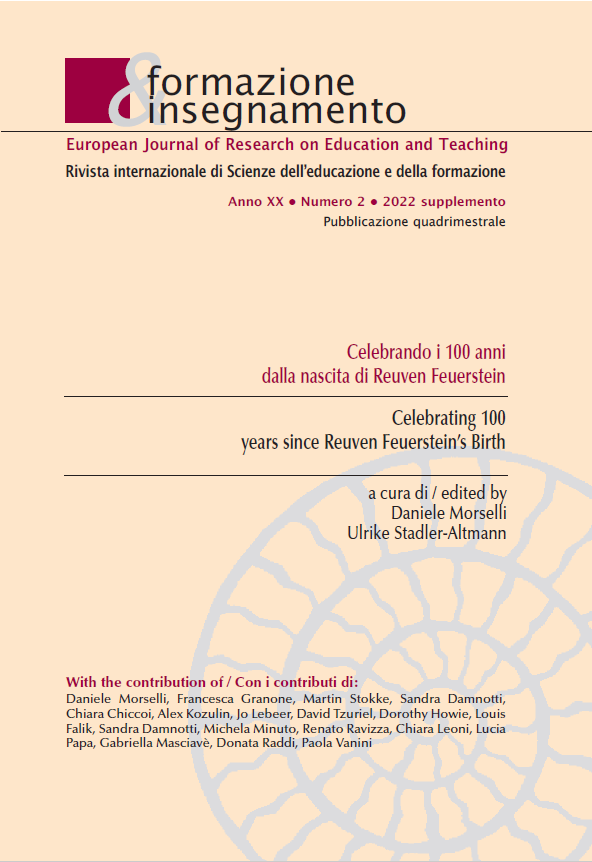"Brain training": Two Types of Approaches to Intervention, and Two Approaches to Evaluation
DOI:
https://doi.org/10.7346/-feis-XX-02-22_05Palabras clave:
Brain training, Feuerstein, Sternberg, Effectiveness criteria, Feuerstein Instrumental EnrichmentResumen
This paper explores a 2016 paper published by Simons and colleagues on the efficacy of ‘brain training’ programs, in relation to the Feuerstein Instrumental Enrichment program for teaching thinking. It compares the focus of this Simons paper on interventions with commercial brain training software, with the broad Feuerstein intervention aimed at structural cognitive modifiability. Two approaches to evaluation are discussed. This paper suggests an alternative set of criteria for evaluating effectiveness to the “gold standard” traditional clinical experimental design criteria used in the Simons paper. This is the criteria put forward by Sternberg for evaluating intellectual skill training interventions. It applies these Sternberg criteria systematically to the review by Simons and colleagues and to the Feuerstein program, citing a wide range of research literature on the Feuerstein program.
Citas
Arbitman-Smith, R., Haywood, H.C. and Bransford, J.D. (1984). Assessing cognitive change. In P.H. Brooks, R. Sperber, and C. McCauley (eds.). Learning and Cognition in the Mentally Retarded. Hillsdale, NJ: Lawrence Erlbaum.
Bachor, D.G. (1988). Do mentally handicapped adults transfer cognitive skills from the instrumental enrichment classroom to other situations or settings? The Mental Retardation and Learning Disability Bulletin, 16, 2, 14 – 28.
Blagg, N. (1991). Can We Teach Intelligence? A Comprehensive Evaluation of Feuerstein’s Instrumental Enrichment. Hillsdale, NJ: Lawrence Erlbaum.
Bowie, C.R., Gupta, M., Holshausen, K., Jokic, R., Best, M., and Milev, R. (2013). Cognitive remediation for treatment-resistant depression: Effects on cognition and functioning and the role of online homework. The Journal of Nervous and Mental Disease, 201, 680 – 685.
Bradley, T.B. (1983). Remediation of cognitive deficits: A critical appraisal of the Feuerstein model. Journal of Mental Deficiency Research, 27. 79 – 92.
Feuerstein, R., Feuerstein, Ra.S., Falik, L. and Rand, Y. (2006). Creating and Enhancing Cognitive Modifiability: The Feuerstein Instrumental Enrichment Program. (Revised and expanded edition of Instrumental Enrichment: An Intervention Program for Cognitive Modifiability.) Jerusalem: ICELP Publications.
Feuerstein, R., Rand, Y., Hoffman, M.B. and Miller, R. (1980). Instrumental Enrichment: An Intervention Program for Cognitive Modifiability. Baltimore: University Park Press.
Herson, M. and Barlow, D.H. (1976). Single Case Experimental Designs: Strategies for Studying Behaviour Change. New York: Pergamon Press.
Howie, D. (2020) Thinking about the Teaching of Thinking: The Feuerstein Approach.2nd edition, London: Routledge.
Howie, D.R., Richards, R. and Pirihi, H. (1993). Teaching thinking skills to Maori adolescents. International Journal of Cognitive Education and Mediated Learning, 3, 17 – 91.
Howie, D.R., Thickpenny, J.P., Leaf, C.A., and Absolum, M.A. (1985). The piloting of ‘Instrumental Enrichment’ in New Zealand with eight mildly retarded children. Australia and New Zealand Journal of Developmental Disabilities, 11, 3 – 16.
O’Hanlon, K. (2011). Changing children’s minds: Instrumental Enrichment. A Thinking Skills Program Research Report, 2004 – 2009., Queen’s University, Belfast.
Ruiz, C.J. and Castaneda, E. (1983). Effects of the instrumental enrichment program on cognitive and non-cognitive factors in subjects of different socioeconomic strata. Venezuela: Universidad de Guayana.
Savell, J.M., Twohig, P.T. and Rachford, D.L. (1986). Empirical status of Feuerstein’s ‘Instrumental Enrichment’ (FIE) technique as a method of teaching thinking skills. Review of Educational Research,56, 381 – 409.
Shayer, M. and Beasley, F. (1987). Does Instrumental Enrichment work? British Educational Research Journal, 13, 101-119.
Simons, D.J., Boot, W.R., Charness, N., Gathercole, S.E., Chabris, C.F., Hambrick, D.Z. and Stine-Morrow, E.A.L. (2016). Do “brain-training” programs work? Psychological Science in the Public Interest, 17, 3, 103 – 186.
Sternberg, R.J. (1979). The nature of mental abilities. American Psychologist, 34, 214 – 230.
Sternberg, R.J. (1983). Criteria for intellectual skills training. Educational Researcher, 6 – 12, 26.
Sternberg, R.J. (1984). How can we teach intelligence? Educational Leadership, September, 42(1), 38 – 48.
Sternberg, R.J. (1985). Instrumental and componential approaches to the nature and training of intelligence. In S.F. Chipman, J.W. Segal, and R. Glaser (eds.) Thinking and Learning Skills. Vol.2, Research and Open Questions. Hillsdale, NJ: Lawrence Erlbaum.
Sternberg, R.J. (2000). Group and individual differences in intelligence: What can and should we do about them? In A. Kozulin and Y. Rand (eds.) Experience of Mediated Learning: An Impact of Feuerstein’s Theory in Education and Psychology. Oxford: Pergamon.
Sternberg, R.J. (2015). The current status of the Theory of Structural Cognitive Modifiability in relation to theories of intelligence. Transylvanian Journal of Psychology, Special Issue, 2015.
Terman, L.M. and Merrill, M.A. (1960). Stanford Binet Intelligence Scale-3rd. Revision, Form L-M. Boston: Houghton Mifflin.
Thickpenny, J.P. and Howie, D.R. (1990). Teaching thinking skills to deaf adolescents: The implementation and evaluation of Instrumental Enrichment. International Journal of Cognitive Mediation and Mediated Learning, 1, 193 – 209.
Tzuriel, D., Samuels, M.T. and Feuerstein, R. (1988). Non-intellective factors in dynamic assessment. In R. Gupta and P. Coxhead (eds.) Cultural Diversity and Learning Efficiency, Hampshire: Macmillan Press.
United Nations (1989). United Nations Convention on the Rights of the Child, Geneva: United Nations.
Descargas
Publicado
Cómo citar
Número
Sección
Licencia
Derechos de autor 2022 Dorothy Howie

Esta obra está bajo una licencia internacional Creative Commons Atribución 4.0.
Formazione & insegnamento se distribuye bajo la licencia Atribución 4.0 Internacional (CC BY 4.0).
Para más detalles, por favor refiérase a nuestra Política de Repositorio y Archivo, así como a nuestros Términos de Derechos de Autor y Licencia.





